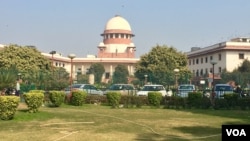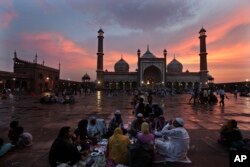India’s Supreme Court is examining Islamic family laws that allow Muslim men to divorce their wives by saying three times the word “talaq,” which means divorce. The court action comes in response to a Muslim woman’s petition challenging the constitutional validity of instant divorce and polygamy.
Conservative Muslim organizations are staunchly opposing, however, any judicial scrutiny of Islamic laws that govern the community in family-related matters.
The petition was filed by a Muslim woman, Shayara Bano, who was divorced after 13 years of marriage through the so-called “triple talaq” system. She said that this provision treats women like “chattel belonging to men” and militates against modern principles of human rights and gender equality.
In her petition, Bano said there have been cases of men divorcing their wives by sending the three words over Facebook, Skype and text messages.
India has separate laws for each religion that govern marriage, succession, adoption and maintenance.
Bano’s plea to outlaw "triple talaq" has the strong backing of women activists who have long campaigned for a ban on the controversial practice and questioned the system that has no room for a woman’s voice to be heard.
“This arbitrariness has a lot of impact on her. She has nothing to say in this whole process. Her opinion, her say in this matter has just no place,” said Noorjehan Safia Niaz, co-founder of Bharatiya Muslim Mahila Andolan (BMMA), an organization at the forefront of demands to ban “triple talaq.”
Groups like the BMMA and some scholars of Sharia law call “triple talaq” a travesty of divorce as envisaged in the Koran. They say the word has to be pronounced over three months and accompanied by efforts at reconciliation.
The triple pronouncement of talaq in one go, as allowed in India, has been banned in many nations, including Pakistan, Iran, Indonesia and Bangladesh.
Now, calls are growing among Indian Muslim women for a well-defined Muslim law that criminalizes polygamy and unilateral divorce.
A recent study by BMMA found that more than 90 percent of Indian Muslim women want an immediate ban on “oral divorce,” which they said must involve negotiation. It slammed the practice as a “major injustice.”
A government committee that studied the status of women in India has also recommended outlawing “triple talaq” and said the custom makes Muslim wives extremely insecure and vulnerable.
On Monday, while hearing the petition of Shayara Bano the Supreme Court ordered the government to submit the report.
Tahir Mahmood, an expert on Islamic law, said while many women have knocked at the doors of the highest court seeking better maintenance, the latest petition tries a radically different approach. “Instead of remaining content with what Muslim law has to provide, someone is saying the entire process is unconstitutional. This is something novel,” he said.
However, there is strong opposition to reform of the divorce law from clerics and influential Muslim organizations, such as the powerful All India Muslim Personal Law Board (AIMPLB), which maintains the judiciary has no power to go into the validity of Muslim personal laws.
Syed Qasim Rasool Ilyas, a prominent member, said the AIMPLB has told the court that “Islamic law is not legislated in the parliament of the country. It is prescribed by the Koran. It is a religious matter, and in religious matters, Supreme Court does not have any locus standing.”
Ilyas feels the issue of “triple talaq” has been “blown out of proportion” and says the AIMPLB is carrying out a reform campaign to impose restrictions on its use and spread awareness among Muslim men. “They should be properly taught, they should be properly educated, so that this type of situation should not exist,” he said.
Muslim women organizations, however, question the AIMPLB for considering itself the representative of the community and say its efforts at education have had little impact.
“In spite of so many women suffering, in spite of so many Muslim women’s organizations wanting change, this body has not been sensitive to these demands and it is not willing to change, not willing to go along with times. Why should anybody listen to them?” said Niaz.
Despite the recent judicial intervention, scholar Tahir Mahmood is skeptical about any quick headway in the campaign to outlaw “triple talaq,” because such a change also needs support from the government.
“The community is not ready, the segment of the community which is under the influence of the Mullahs. The problem is that rulers listen to them only, they don’t listen to saner voices,” he said.
Not wanting to upset clerics and influential Muslim organizations, successive ruling parties have steered away from the sensitive issue. Muslims -- India’s largest religious minority -- make up 13 percent of the population and are a powerful voting bloc wooed by many parties.





